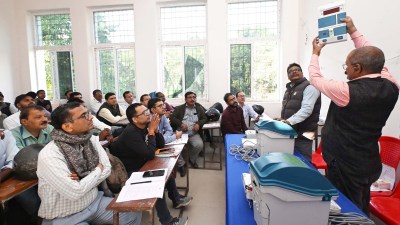PM to Atal: Bhishma Pitamah, rise and back deal
With time running out on the nuclear deal, Prime Minister Manmohan Singh today made a last-ditch effort at forming a consensus...

With time running out on the nuclear deal, Prime Minister Manmohan Singh today made a last-ditch effort at forming a consensus appealing to his predecessor Atal Behari Vajpayee to “listen to the call of his conscience” and back the deal by rising above party politics.
Replying to the discussion in the Rajya Sabha on the motion of thanks on the President’s address, the Prime Minister surprised the BJP when he reached out to Vajpayee over the party’s head. Calling him the “Bhishma Pitamah (the grand patriarch) of Indian politics,” he went on to praise Vajpayee for his “courageous” steps to promote peace with Pakistan.
“The most courageous steps to build peace were taken by Prime Ministers Nawaz Sharif and Atal Behari Vajpayee. We have continued the process with President Musharraf,” he said.
Asking the BJP to have a rethink on its opposition on the nuclear deal, the Prime Minister said, “Recently, I read with keen interest an interview of Brajesh Mishra, National Security Advisor to the NDA government.
“I was happy to see that, responding to the call of conscience, he has openly supported the nuclear deal…Now I urge the Bhishma Pitamah of Indian politics, Shri Atal Behari Vajpayee, to also listen to the call of his conscience and rise above narrow party interests to support the deal,” he said.
While the BJP benches looked taken aback by the Prime Minister’s appeal, they were visibly upset by Singh’s reference to former US Deputy Secretary of State Strobe Talbott to make the point that the NDA could have settled for less on the nuclear deal.
“I have also seen the statement of Strobe Talbott who negotiated on this with the NDA government, saying that if NDA government was prepared to follow even 50 per cent of the deal that would be enough,” the Prime Minister said.
In an interview to The Indian Express Editor-in-Chief Shekhar Gupta on NDTV 24×7’s Walk The Talk, Talbott, one of the key US interlocutors during the NDA government, had said that had the Clinton Administration offered the deal that President Bush is offering India, the BJP would have been “astonished” and would have signed the agreement. “I can’t understand how BJP is opposing the deal,” Talbott had said, adding that, “I know the answer to my question and that is, politics is politics.”
When asked if he would tell the BJP leaders that they would have settled for less, Talbott said, “Ever so politely.”
But the PM’s reference to Talbott triggered noisy protests from the BJP with former External Affairs Minister Yashwant Sinha interrupting to say that Talbott’s statement was “absolutely wrong” and that the BJP had already contradicted it. Members of the Left, who have been dead opposed to the nuclear pact with the US, were all ears as the Prime Minister explained the backdrop of India’s talks with the IAEA.
“As the honourable members know, India is presently negotiating with the International Atomic Energy Agency for an India-specific safeguards agreement. We hope that the negotiations will be successfully completed.
“We also continue to seek the broadest possible consensus within the country to enable the next step to be taken,” the PM said.
The PM’s mention of Brajesh Mishra was a reference to his interview in Rediff.com where he said that “it will be very good if the nuclear deal goes through.”
Mishra had echoed this in an interview to Gupta last November where he had said that in his personal opinion: “If I were to get credible guarantees from the government about the integrity of what we had left behind three and a half years ago, I would tell them to go forward with the deal.”
In the Rediff interview, Mishra was quoted as: “A number of people from the government have spoken to me and they said to me that, ‘We have been and are pursuing the strategic programme’ for which the foundation was laid by the National Democratic Alliance. In the light of my concern for the strategic programme being taken into account I said it is okay; let this nuclear deal go through. It is fine if it goes through.”
Elsewhere, in the same interview, he said: “If we want our share of nuclear power to increase then we will need energy cooperation with members of the NSG. From that point of view, it will be very good if the nuclear deal goes through.”
The BJP, however, promptly distanced itself from Mishra. When asked about Mishra’s comments, spokesperson Ravishanker Prasad said: “The deal in its present compromises India’s strategic nuclear capabilities, which is a product of the determination of our scientists and political leadership. It is not acceptable to the BJP and we have said this on record earlier too. There is no change in that position.”
Taking on the BJP on the issue of internal security, the Prime Minister said that terrorism could not be controlled just by enacting draconian laws. “I would like to assure the House that our commitment in the fight against terrorism is absolute,” he said. “Some of the concerns on internal security are valid. But our approach has been as firm as required. Energetic efforts have been made to complete investigations, to bring the culprits to book in all cases of terror attacks,” he said. The BJP countered by asking why the Government was silent on the death sentence to Afzal Guru in connection with the Parliament attack.



- 01
- 02
- 03
- 04
- 05




























